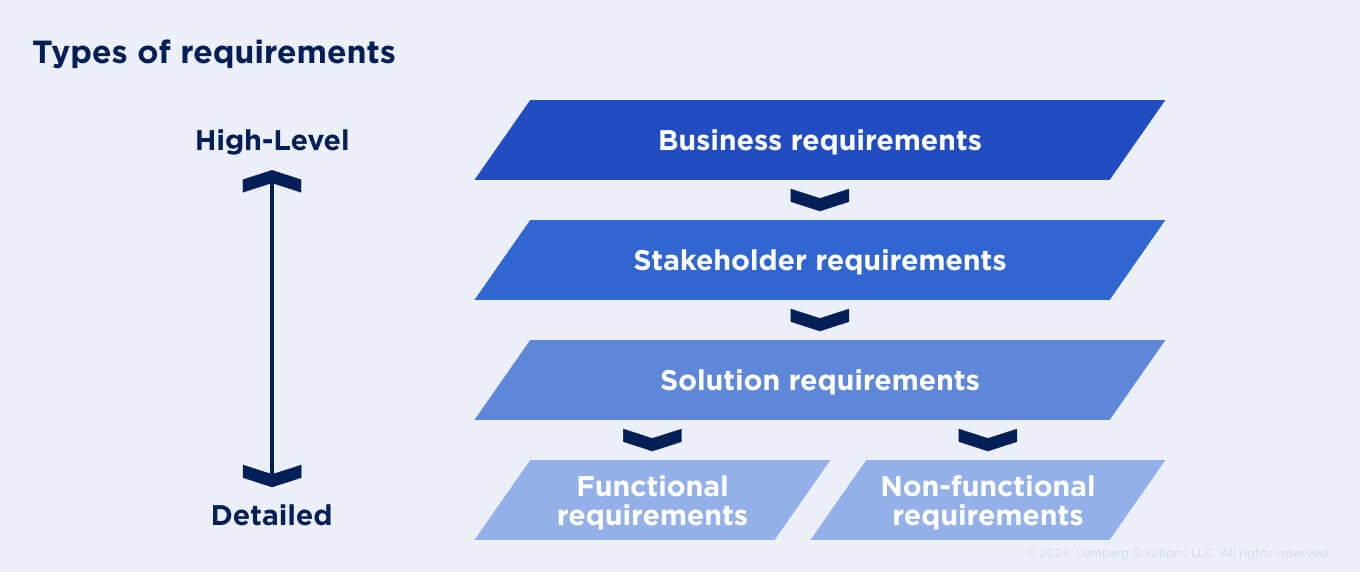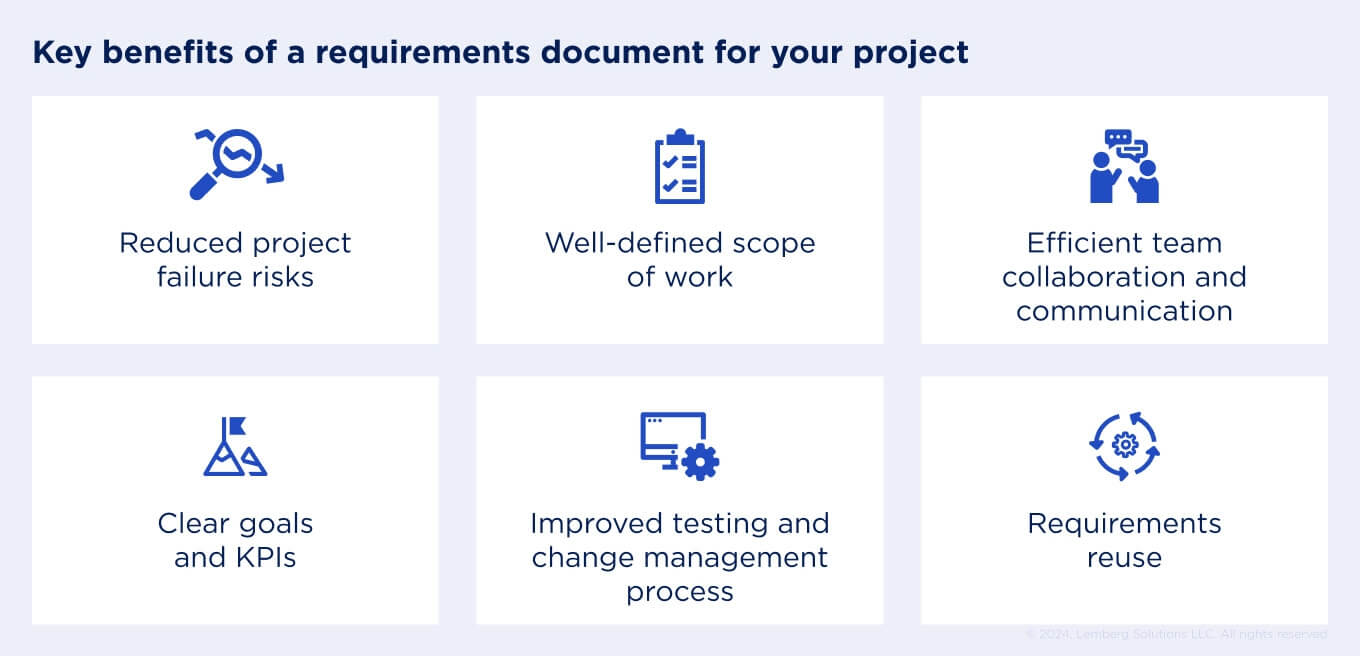Almost 47% of projects are unsuccessful due to vague requirement analysis. So, no matter how skilled your engineers are, a lack of clear requirements can be a serious obstacle to effective task execution and project management, putting your product at risk of failure.
That’s why we compiled a step-by-step guide on how to write requirements document for your project based on Lemberg Solutions’ 15+ years of experience. Keep reading for more tried and tested insights.
What is the requirements document?
The requirements document is a clear statement of the project’s purpose, goals, product specifications, and resources needed to deliver the solution according to business expectations. There are several types of requirements; however, the main ones are business, stakeholder, and solution requirements. Check out a detailed overview of each type below.

Business requirements
A business requirement should explain the product's primary purpose and the business value it will bring. It should also contain the key benefits the organization or its clients will get when the product enters the market.
Good business requirements are written according to SMART criteria, which stands for:
- Specific — must outline business needs
- Measurable — must have measurable goals to verify that requirements have been met
- Achievable — must be realistic to implement within the limits of the project and existing systems
- Relevant — must be aligned with overall business objectives
- Timely — must have a reasonable deadline.
Stakeholder requirements
Stakeholder requirements are based on the demands of the company leaders, managers, or customers who can be affected by the project. While business requirements may be extensive, stakeholder requirements, in turn, might be more individual. The biggest issue here is to align the requirements of different stakeholders, as each may want to cover some personal need that can contradict the project’s bigger mission. The best way out of this challenge is to prioritize the requirements of the key stakeholders and those who will be directly affected by the project’s outcome.
Solution requirements
Solution requirements are the most crucial when it comes to the engineering process. These are specific characteristics that a product must meet. They fall into two large groups: functional and non-functional requirements.
- Functional requirements define the specifics of the product’s operation, its features, and functions.
- Non-functional requirements are about the qualities you want your system to have. They include things like reliability, performance, usability, security, and many others.
You should not underestimate the process of defining, documenting, and prioritizing the product specifications — it requires time, knowledge, and effort. In the majority of projects, the requirements documentation makes the developer's life easier and increases the chances of a tech solution to conquer top places in the highly competitive market.
Why are clear engineering requirements documents important?
The absence of clear requirements is like playing a broken telephone game with the engineering team. The end result is unpredictable, and there is a high chance of not receiving the product that was planned at the beginning. The software development team must know what they are building, and to do so, they need to have a сlear idea of the project’s demands, goals, and functionalities.
So, for the past decade, more companies started to prioritize hiring a specialist who will bridge the gap between stakeholders and software engineers. Usually, it’s the role of a business analyst — a person who can take some of the responsibilities from the product owner on gathering key requirements that define the business needs, goals, and objectives, ensuring that all essentials are covered. Having in-depth knowledge of how to write requirements for a project, a business analyst's daily routine includes dividing features into user stories, managing the backlog according to the priorities set by the product owner, and offering solutions based on market tendencies.
If the business analyst covers the requirements part correctly, a product owner will have more time to concentrate on strategic tasks such as setting product goals and defining key performance indicators (KPIs), leading market research and competitive analysis, and creating a long-term vision of the product's direction.
A well-written requirements documentation will strengthen your project's chances to succeed. If you are still in doubt, check the key benefits requirements document can bring to your project:

Reduced project failure risks
Project requirements gathered by a business analyst at the beginning of software development provide the engineering team with a transparent roadmap, reducing the possibility of serious project risks or unexpected budget overruns. Since business analysts collaborate closely with developers, they can identify any technical constraints of the solution and inform the stakeholders about possible ways to resolve potential issues before development begins. With specific requirements documentation, there will be more clarity about the product and fewer chances of misunderstandings, which can lead to rework.
Well-defined scope of work
Scope creep, the uncontrolled growth in a project’s requirements, is often the reason projects miss deadlines or go over-allocated in costs and resources. Well-gathered requirements from the product owner or subject matter experts that are documented or presented in schemas or diagrams will set clear boundaries for the project. Usually, a user story map or feature list will form the basis for the project estimate, helping to avoid scope creep and assemble an effective project team.
Efficient team collaboration and communication
Miscommunication in the team costs more than $12,506 per employee for US businesses annually. Creating a single source of truth minimizes miscommunication cases and leads to effective cross-team collaboration. Documenting in detail and decomposing features into user stories with acceptance criteria, schemas, and wireframes will align the team around shared goals. If any requirements are just said during a meeting and are not processed properly, there is a chance they can be forgotten or interpreted differently from the original idea. To avoid misunderstandings, you need to have a responsible person who will keep everything documented. In case of additional questions arising during the development phase, the engineering team can always refer to the requirements documentation.
Clear goals and KPIs
Business goals and KPIs determine the company's success. Your software development process should as well have clearly defined success indicators to track the progress, quality of work, and potential challenges. Moreover, setting clear goals can help you estimate your IT project more accurately and allocate your resources wisely.
Improved testing and change management process
Validating whether the end product meets the initial stakeholders' needs is easier with good requirements. Especially during the quality assurance stage, when the team runs in-depth software testing to define whether products conform to all the requirements. Moreover, the requirements documentation is a living document that is constantly updated. When changes are requested, business analysts can efficiently conduct an impact analysis, identify the parts of the system affected by the change, and update the documentation according to the new data.
Requirements reuse
Some organizations improve their processes gradually. They start with a small project for one unit and, in case of a successful implementation, decide to expand their initiative. Requirements documentation can be used as a reference for further upgrades, so there will be no need to start everything from scratch. This approach will significantly save your time and budget and make a valuable knowledge base for newcomers, helping them quickly get into the work.

How to define requirements for your project?
No matter what your project is about, the product requirement document consists of standard blocks and steps that need to be covered before launching the development process. Below, you can find the basic overview of how to write requirements for a project:
Step #1: Pre-writing preparation
Before diving into the requirements writing process, make sure to conduct a market research and competitor analysis and gather all crucial information you may need. You should communicate closely with your key stakeholders to understand their demands and pain points, define how the product will satisfy their needs, and how it will benefit the company. Only after a profound research, you can start to compile all the information into the requirements document.
Step #2: Specify the project’s purpose
At this stage, you should outline a summary of your research, illuminating the project's value proposition. This section should be as precise as possible, covering measurable success and performance metrics. This step is important for engineers to choose the specific tools and approaches they will use to achieve the set goals.
Step #3: Determine the workflow and specifications
The next step is describing the workflow and product specifications. This part is vital for the software engineering team as they will use it as a guide to understand what kind of functionality they should implement. However, you should not specify “how” the features may be implemented; instead, describe how the software should function.
Step #4: Define budget and timeframes
The project workflow should be divided into phases, each with a detailed financial statement describing the fund's allocation to implement the project and a thorough schedule. Also, don’t forget to add important milestones the development team should achieve to track the progress of their work. Remember to evaluate unexpected financial expenses and time delays due to unpredictable external obstacles, like regulatory changes, that can impact the development process.
Step #5: Create a cost-benefit analysis
This step demands a profound analytical approach, as you should assess whether the company's investment in the project's development will pay off in the future. The best solution here is to create a spreadsheet with expenses allocated for the project as well as unexpected costs and estimate the sum of money or non-financial benefits the company can gain in case of successful project implementation.
Step #6: Validate the document
Collect feedback from stakeholders and the development team to confirm that everyone is aligned on the project’s purpose and product specifications. After everyone has reviewed the document, the development process may start.
Final thoughts
Clear and accurate requirements are a base for the successful outcome of your project. Neglecting this stage and denying professional help may cause irreversible losses for your business: loss of a great deal of money, time, and, in some cases, even a competitive edge on the market.
Investing in the BA expert may be a reasonable choice to make sure you and your development team get a good engineering requirements document and, based on that, build an efficient project workflow to achieve all the deliverables. Lemberg Solutions team can help you to build a detailed development plan – from requirements gathering based on your unique business needs to constant support at each stage of product development.
